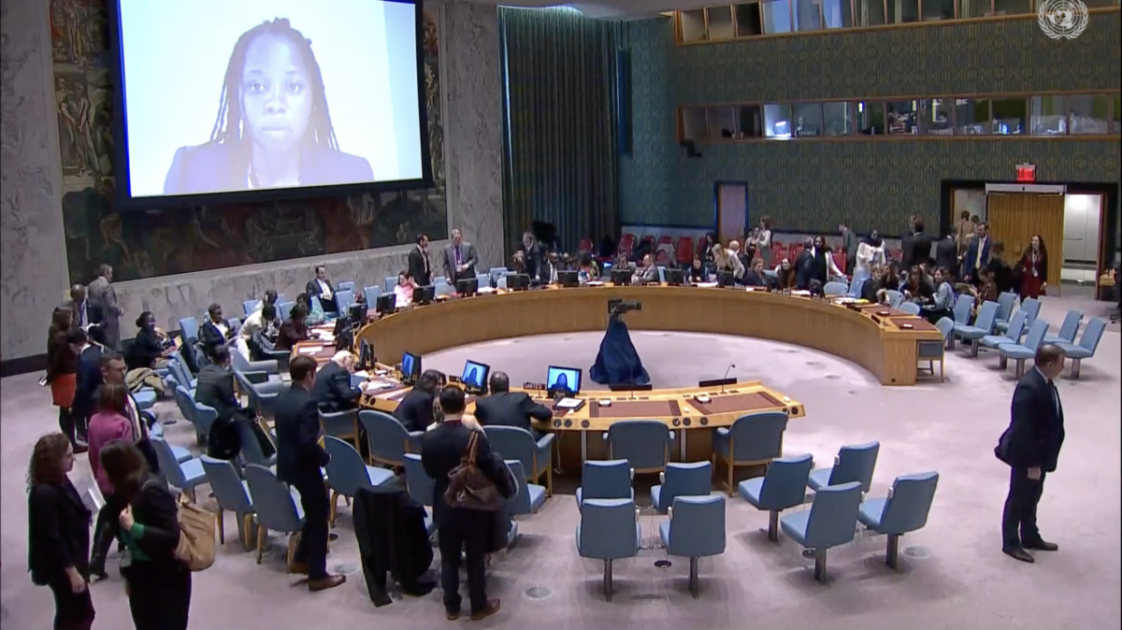Africa
Africa
Current and Past Recommendations to the UN Security Council (Monthly Action Points)
As the Security Council prepares to consider the renewal of the mandate UN Multidimensional Integrated Stabilization Mission in the Central African Republic (MINUSCA), the Security Council should expand upon and strengthen the existing women, peace and security (WPS) provisions in the mandate and all other WPS-related references (S/RES/2448 (2018), OPs 3, 11, 16, 17, 32, 39(a)(iii), b(iii, iv, v), 40(b)(iv), (c)(i, ii), (d)(ii), 57). Specifically, the Council should:
- Request those responsible for the implementation of the Political Agreement for Peace and Reconciliation in the CAR respect WPS provisions, and ensure that the work of the Executive Committee responsible for monitoring the implementation of the agreement is transparent, and that MINUSCA provide gender-sensitive technical support to those implementing the peace agreement (Political Agreement for Peace and Reconciliation in the CAR, Arts. 1g, 4d, 5c; Annex 1, Art. 2d, 5).
- Explicitly list women and girls with disabilities and women human rights defenders as specific groups that should be protected under MINUSCA’s protection of civilians mandate (S/RES/2448 (2018), OP 39(a)) and require the mission to consult with women’s civil society organizations, humanitarian and human rights organizations in implementing a gender-sensitive strategy for protection of civilians, including when supporting the government in implementing the peace agreement.
- Call on the Steering Committee responsible for establishing the Peace, Justice, Reparation, and Reconciliation Commission (CVJRR) to ensure all work is gender-sensitive and respects gender parity when establishing the latter. (S/RES/2448 (2018), OP 57; Political Agreement for Peace and Reconciliation in the CAR, Arts. 9, 10, 11).
- Call on authorities to ensure all work is gender-sensitive, and gender parity is respected in all other bodies involved in the peace process, including, but not limited to, the National Implementation Committee (CMON), the Prefectural Implementation Committees (CMOP), and Local Peace Committees (CLP). (Political Agreement for Peace and Reconciliation in the CAR, Arts. 31, 32).
The Council should further call on the Government to fully implement the regional action plan for the Central African region for the implementation of Resolution 1325 adopted in May 2018, and to update its National Action Plan (NAP) on Resolution 1325 (2000) through a consultative process that includes the participation of women’s groups and ensures there is both political support and financing for implementation of any updated plan. Additionally, in the context of the African Initiative for Peace and Reconciliation in the CAR and the work of the Panel of Facilitators, the Council is urged to include new language calling on these processes to be inclusive, with particular attention given to the participation of women (S/RES/2448 (2018), OP 3). Despite the requirement to mainstream gender across all components of the mandate, analysis of past reports of the Secretary-General show that there is a lack of implementation. The Council should focus on holding senior leaders accountable for the performance and fulfillment of MINUSCA’s mandate, including its obligation to mainstream gender.
As the Security Council prepares to consider the renewal of the mandate UN Multidimensional Integrated Stabilization Mission in the Central African Republic (MINUSCA), the Security Council should expand upon and strengthen the existing women, peace and security (WPS) provisions in the mandate and all other WPS-related references (S/RES/2448 (2018), OPs 3, 11, 16, 17, 32, 39(a)(iii), b(iii, iv, v), 40(b)(iv), (c)(i, ii), (d)(ii), 57). Specifically, the Council should:
- Request those responsible for the implementation of the Political Agreement for Peace and Reconciliation in the CAR respect WPS provisions, and ensure that the work of the Executive Committee responsible for monitoring the implementation of the agreement is transparent, and that MINUSCA provide gender-sensitive technical support to those implementing the peace agreement (Political Agreement for Peace and Reconciliation in the CAR, Arts. 1g, 4d, 5c; Annex 1, Art. 2d, 5).
- Explicitly list women and girls with disabilities and women human rights defenders as specific groups that should be protected under MINUSCA’s protection of civilians mandate (S/RES/2448 (2018), OP 39(a)) and require the mission to consult with women’s civil society organizations, humanitarian and human rights organizations in implementing a gender-sensitive strategy for protection of civilians, including when supporting the government in implementing the peace agreement.
- Call on the Steering Committee responsible for establishing the Peace, Justice, Reparation, and Reconciliation Commission (CVJRR) to ensure all work is gender-sensitive and respects gender parity when establishing the latter. (S/RES/2448 (2018), OP 57; Political Agreement for Peace and Reconciliation in the CAR, Arts. 9, 10, 11).
- Call on authorities to ensure all work is gender-sensitive, and gender parity is respected in all other bodies involved in the peace process, including, but not limited to, the National Implementation Committee (CMON), the Prefectural Implementation Committees (CMOP), and Local Peace Committees (CLP). (Political Agreement for Peace and Reconciliation in the CAR, Arts. 31, 32).
The Council should further call on the Government to fully implement the regional action plan for the Central African region for the implementation of Resolution 1325 adopted in May 2018, and to update its National Action Plan (NAP) on Resolution 1325 (2000) through a consultative process that includes the participation of women’s groups and ensures there is both political support and financing for implementation of any updated plan. Additionally, in the context of the African Initiative for Peace and Reconciliation in the CAR and the work of the Panel of Facilitators, the Council is urged to include new language calling on these processes to be inclusive, with particular attention given to the participation of women (S/RES/2448 (2018), OP 3). Despite the requirement to mainstream gender across all components of the mandate, analysis of past reports of the Secretary-General show that there is a lack of implementation. The Council should focus on holding senior leaders accountable for the performance and fulfillment of MINUSCA’s mandate, including its obligation to mainstream gender.
Relevant Resources







